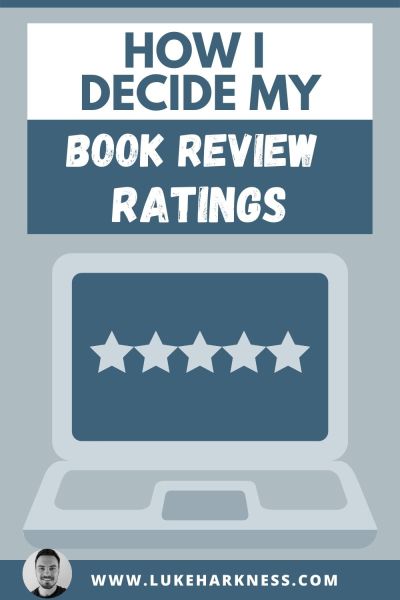I’ve written over 60 book reviews at the time of writing this article. I’ve covered romance, fantasy, science-fiction, contemporary fiction, mystery, thriller and more. But how exactly do I work out what to review my books out of five?

Why maximum five stars for a book review?
First off, I’ll discuss why I chose the five-star rating alongside the text-aids you see at the bottom of each of my book reviews. The main reason is that it takes away from the number of ratings I can give. If it was out of 10, I’d have to choose from ten numbers and this could leave me considering for far too long.
The other reason is that I feel far more comfortable giving a book five out of five stars than I would ten out of ten. Ten out of ten simply feels too high of a rating to give a book.
Why the “very good” and “amazing” etc too?
This one is quite simple too – essentially it gives those who want a better understanding of what these ratings mean a visual representation. If I was to say to you I’d give a book four out of four stars, I may give loads of books three-star and that four-star is a very high rating for me. By putting “very good” and “okay” to decipher between four and three stars, people know what I actually mean by these ratings.
Why break them down into Plot, Characters and Summary?
When I used to write essays are university, my lecturer told me a great tip to write content would be to write out categories and subtitles first. This way, it would not only give my piece direction, but it would essentially give me guidance as to what to talk about.
This is the exact same here, when I’m writing a review about certain books, I could go off on such a tangent with some of the things I want to say; however, with these subtitles, I try and restrict myself to covering these two subjects.
I also feel that these allow me to cover the two main areas that people read books reviews for. I can cover what I thought of the overall story, any twists that happen and the writing style. I can also cover whether I liked any of the characters and whether the book was character or plot-driven so you know if it’s the sort of book for you.
So how do I decide the actual book review ratings?
On my blog, so far, I’ve only given three, four or five-star ratings to book. However, I do have graphics created for one and two-star reviews. Luckily, I’ve never read a book that I genuinely thought was that bad.
My general thinking with the book reviews is such:
Five-star this is a MUST READ. I’d recommend reading this to absolutely anybody who asked me for a book recommendation. Some of these I feel I can recommend to anyone, others I feel would require that person to like a certain genre.
Four-star is books that I still think are absolutely fantastic and would offer up as a suggestion for someone to read as their next read. However, these would only come if they’ve already read the five-star suggestion I’ve given them.
Three-star books are as suggested – they’re average. I didn’t overly dislike them, I just didn’t click with them and they’re not books I’d rush to suggest to other people.
Two-star is a rating I’ve not yet given. However, I feel I’d have to actively dislike the book. It would be a collection of bad writing, an unengaging story and truly dull characters.
One star is a rating I hope to never have to give. A one-star review would likely be a book that is actively offensive, half-written or is just downright awful.
I often decide the rating by the time I’ve finished the book. If I come out of a book thinking “wow, I absolutely loved so much about that” then in my review I’ll break it down into why I loved each aspect of the book. However, it happens more than often where I will decide the final review for the book whilst writing the review. For example, I may be digesting the book and think that I enjoyed it, however, there was something that stopped it from being five-star for me and as I review it, I realise it’s because the characters weren’t actually that interesting or that the plot didn’t reach the potential it had.
Finally, I never want to give an average review that includes decimals as this would then see me falling into a similar problem of giving them a rating out of ten instead of five, there’d be different average ratings that would make the reviews more precise. I’m keen to not differentiate my interest in books too much – I want to keep my opinions on books simple and approachable.
Book review rating summary
As aforementioned, I want my book reviews to be as approachable to people as possible. I want you to come on here, read around 1,000 words on what the book is about – what’s good, what’s bad, and whether it is the book for you.
By keeping the rating a low number, by not writing too much and but not writing in a complex way, I hope I achieve this. Let me know via my social media channels or in the comments below how I could improve these reviews.
Want more tips on writing reviews on a blog? Why not check out my article on How to organise your blogging content when just starting out or my article on 50 things to know when starting and running a blog? Or if you’re looking to expand your content outside of book reviews, here are 22 post ideas for book bloggers.
